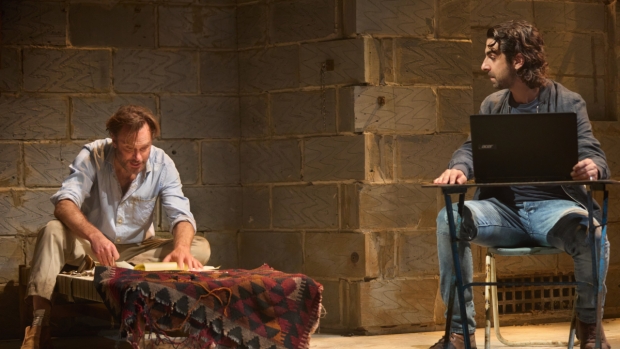
© Mark Douet
The Invisible Hand is an economic concept coined by Adam Smith a couple of centuries back, but here it's transformed into a latent, garish force by Ayad Akhtar's bristling play, returning to the Kiln after first been staged on these shores at the venue (then the Tricycle) in 2016.
It follows trader Nick, captured and held in a single concrete-lined cell by a Pakistani organisation. Ditched by his bank, Nick promises to make up his ransom money and barter his way to freedom by doing what he does best: trading up to the agreed sum of $10,000,000. Think Iron Man with more complex economic theory and high emotional stakes, minus the superhero suit and glorification of the American military-industrial complex.
It's the sort of juicy, thorny, knotty one-room play that gets the blood pumping – remarkable given that extended passages just see two men argue while looking at a laptop screen. The recent events with Gamestop and Reddit make it all feel all the more relevant – the financial house of cards is a simple nudge away from collapse.
While limited in space, the ideas in Akhtar's piece bounce across every corner of the globe – from Bretton Woods to the beaten streets of Pakistan – Nick's financial exploits pitched against a backdrop of wider discussions around Western capitalist ideology and concepts of neo-imperialism after World War Two: what does society look like on the fringes of the Dollar empire?
The Invisible Hand is also one tightening around each character's throat – as Nick tries desperately to balance stock manipulation and selfishness, gambling futures in order to secure his own, those around him begin to weigh up their own agendas. Akhtar provides a masterclass in taught, economic dialogue, aided by artistic director Indhu Rubasingham's slick direction. Sound designer Alexander Caplen's crickets, buzzing from around the set, purr like the sound of hundreds of servers processing data with split-second accuracy. Current as currency.
The cast is largely similar to the show's 2016 run, save Scott Karim, who joins as the idealistic yet wily jailor Bashir, a south Londoner whose principles have transported him across the globe. Sweating in skinny jeans, batting away loose hair as he furiously types under Nick's shackled tutelage, he's the perfect foil for Tony Jayawardena's grand Imam Saleem – all full of pomp in a pristine white tunic – strong work from designer Lizzie Clachan and costume supervisor Megan Keegan. Daniel Lapaine gives Nick a matted, out-of-depth mania, while the earnest Dar grounds the story in a sense of real human tragedy thanks to a smaller yet controlled turn from Sid Sagar.
Finally, The Invisible Hand is the one orbiting the drones, ready to cast down oblivion on all four men. The spectral presence of American foreign policy washes over Nick's desperate search for liberty: and the roar of aircraft above dials the tension up high.













